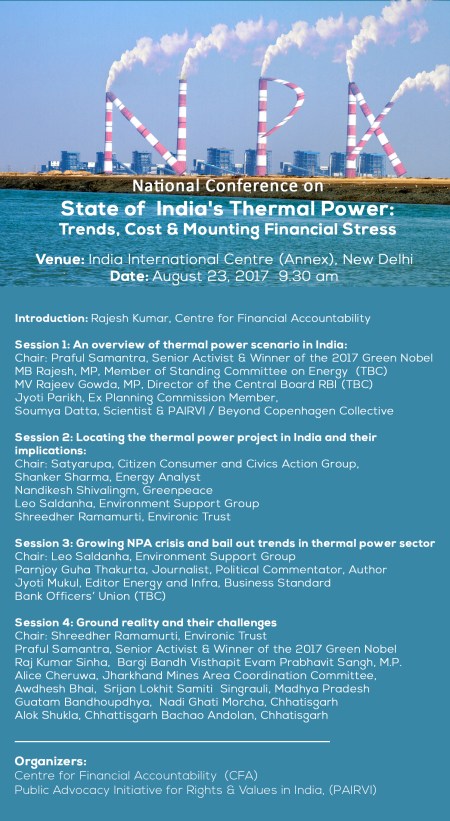National Conference on State of India’s Thermal Power: Trends, Cost & Mounting Financial stress on Aug.23. It will begin at 9:30 AM at Annex First Floor India International Centre, 40, Max Mueller Marg New Delhi
This is being organized by Centre for Financial Accountability (CFA) and Public Advocacy Initiative for Rights and Values in India, (PAIRVI) in Delhi. The conference on 23rd will be a public conference and will be focused largely on the current status of energy finance in India, the NPA crisis and increasing trend of bail outs for corporates in the energy sector.
Talking about energy finance, stressed assets of Indian Banks are on the increase; from INR 12lakh crore to INR 14 lakh crore through revised estimates. Until now, steel sector had the highest contribution to stressed assets. However, the power sector is fast catching up. The stressed assets of the power sector are still not given the sharp attention it needs. There are a total of 35,900 MW of thermal and hydro power projects that are on the verge of becoming stressed assets. This is resulting in bad loans in this sector, and damaging the entire banking sector. Around 17 under-construction thermal power projects with a capacity of 18420 MW have been stalled due to financial issues while another 17 gas thermal power projects with the capacity of 11,154 MW are stressed according to the government data by the end of February 2017. Even hydro power projects have the same story. A total of 20 hydroelectric projects with the capacity of 6,329 MW are struggling due to financial issues. The consequences of this situation are that the stressed assets of private companies are becoming stressed assets for banking institutions who are eventually being bailed out by the government through public money.
Also, one of the first UMPP – Coastal Gujarat Power Limited (CGPL) owned by TATA Power is incurring massive losses every quarter and is ready to sell its 51% stake for a token sum INR1. Similarly, Adani’s Mundra power projects also approached The Gujarat Urja Vikas Nigam Limited (GUVNL) for bail out. Both projects are financially not viable because Supreme Court nullified the plea for the compensatory tariff due to price rise of imported coal. The trend of the government bailing out private companies with public money is on the increase. Almost a thousand crores loan has been given to these two projects alone by Indian banking and non-banking institutions. Financial non-viability of these two projects has raised questions on the banking system and its due diligence processes before providing a loan. There is a case against the builders in of both these projects in Supreme Court for over-invoicing equipment and coal imports.
Corporations are not only robbing the public of their money but also ignoring the social and environmental impacts of these projects. Before providing loans financial institutions are neither doing the due diligence process properly nor do they adhere to any the social and environmental mandatory requirements after they receive loans. The large coal and hydro projects apart from causing massive displacement also hugely impact the livelihood of people who in most cases are farmers. These projects also adversely impact environment causing serious health concerns for people and destruction of ecology. For fulfillment energy needs of urban India is coming at the cost of land and livelihood of rural communities.
Responding to this critical situation, we have organized this two-day consultation to understand this crisis and to plan ahead.

